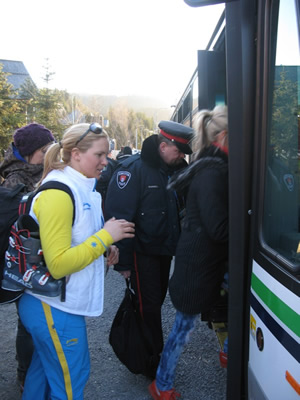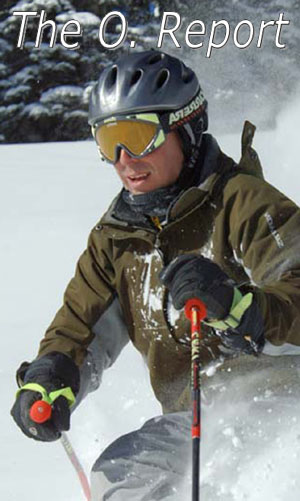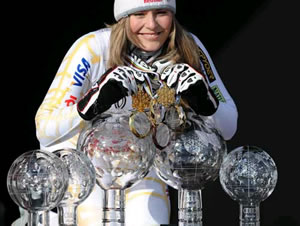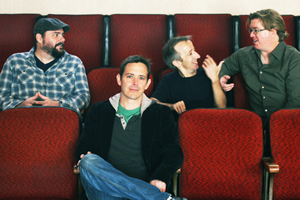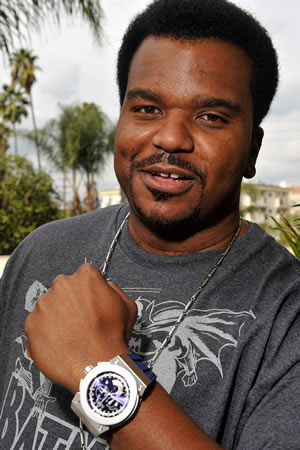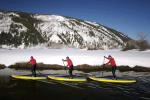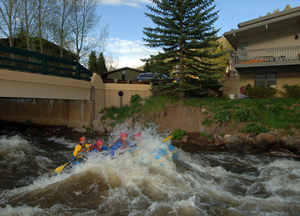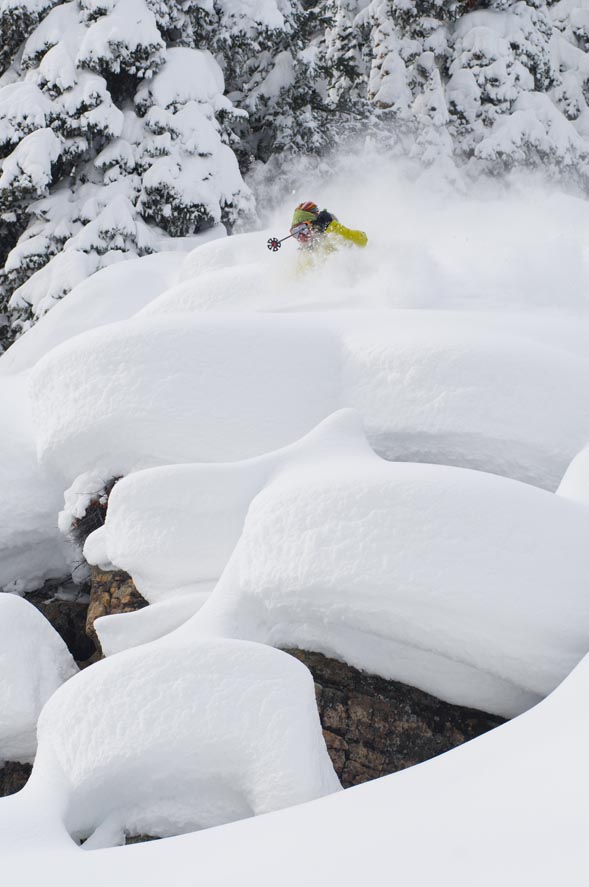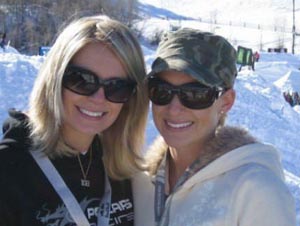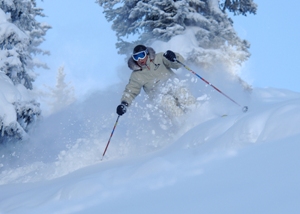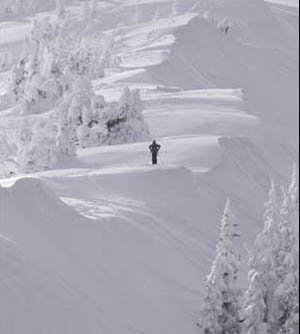By David O. Williams
Colorado must pass on 2022 Olympic Games unless mountain rail is the prize
April 1, 2010 —
The 2010 Vancouver Winter Olympics were essentially two different Games - the Vancouver and Whistler Olympics – separated by a mere 70 miles and an unnecessarily difficult mass transit mess that took more than three hours to navigate.
The inexplicable, and to me indefensible, decision to shut down part of the scenic Sea-to-Sky Highway to most private vehicle traffic isolated the mountain resort area of Whistler – host to the sliding, Nordic and ski racing events – from the vibrant metropolitan area of Vancouver, which hosted hockey, skating, freestyle skiing, snowboarding and curling.
It would be the equivalent of shutting down Interstate 70 between Denver and the mountain resorts of Summit and Eagle County in Colorado and inviting the world to come enjoy a grueling three-hour bus ride. That, to me, is simply an unacceptable scenario if Denver wants to seriously consider hosting the 2022 Winter Olympics.
Harry Dale, an engineer and former telecommunications project manager who’s now a Clear Creek County commissioner and president of the Rocky Mountain Rail Authority (RMRA), agrees. The only reason he thinks Colorado should even consider such a bid is if it results in a massive influx of federal funds to build a mountain rail system.
“You’ve got to come up with a plan that is going to be able to move people effectively, and I don’t think just shutting the highway down and running buses is much of a plan,” said Dale, who helped build the video distribution network prior to the Salt Lake City Winter Olympics in Utah in 2002.
Having just completed a grueling high-speed rail feasibility study examining the possibility of such a system along the Interstate 70 and Interstate 25 corridors in Colorado, Dale noted Salt Lake City not only landed funds for highway improvements, but also built light rail and some commuter rail as a result of the Games.
Colorado voters in the 1970s rejected the Winter Olympics after the International Olympic Committee had already awarded Denver the 1976 Games, in part because of the massive tax burden and a perceived lack of infrastructure funding to accommodate huge Olympic crowds and the subsequent development.
As a result, Denver may have cost itself a shot at not only the 2018 Winter Olympics, which the United States Olympic Committee decided to forego in order to focus on a failed 2016 Chicago Summer Olympics bid, but some observers say it lost any realistic hope of landing any future Games.
“The fear in ’76 was, ‘Well, we’re not going to get any money for infrastructure and it’s going to place this huge demand on us, so why would we want [the Olympics]?’” Dale said. “And I would say 2022 is the same way. If you’re not going to get $20 billion for infrastructure, don’t do it. You’ve got to walk away with something.”
Vancouver and Whistler, in my opinion, walked away with very little for $6 billion. Dale’s $20 billion price tag, incidentally, is about what high-speed rail would cost along I-25 and I-70 – the conclusion of the RMRA study released this week.
A reporter for the Olympic News Service working the alpine skiing events at Whistler, I flew into Seattle in late January to save a few bucks, see family in Bellingham, Wash., and slowly make my way up the coast to Vancouver. Flights into Seattle were half as much as Vancouver (already the victim of Olympic markup), and Amtrak between Bellingham and Vancouver was a mere $19.
Of course, the slow-moving, heavy diesel trains took more than two hours to cover the mere 45 miles between the northern Washington city and Vancouver, British Columbia, but the ride along the Sound is beautiful, peaceful and generally relaxing. I wasn’t in a particular hurry.
The problem, Dale said, with putting passenger service on existing freight rail corridors is that people generally are in a hurry. Heavy, slow-moving trains built to survive collisions with freight trains or derailments in freight corridors often only get up to about 45 mph, which most car commuters can top even in the most onerous of gridlock.
That type of car congestion was obviously what the Vancouver Organizing Committee (VANOC) was trying to avoid by turning the Sea-to-Sky Highway into one big bus lane, but that’s a terrible way to show off $570 million in improvements that merely widened what is still a very meandering route to one of the world’s top-rated ski resorts.
Once in Vancouver I was dismayed to discover passenger rail service to Whistler wasn’t even an option, shut down earlier in the decade as a money loser. The only way to ride the rails to Whistler was on an invite-only train sponsored by the province of Alberta.
When I worked the 2006 Winter Olympics, at least you could catch a train (occasionally even a French high-speed TGV) between Torino, Italy, and the mountain town of Oulx. Once there, everything broke down with lumbering bus service navigating narrow, twisting Alpine roads, but at least rail was a partial option.
Closing I-70 between Denver and Colorado’s ski resorts isn’t feasible. It’s a major interstate trucking corridor and the only real way to get between the metropolitan areas of the Front Range to the more than 20 Western Slope ski areas.
“You’re probably going to have events at five or six different ski resorts,” Dale said. “Say you’re going to do that tomorrow with I-70 just the way it is – you’re screwed. There’s no way you’re going to do this.”
Even though I live in Vail, my own vision would be to spread the Olympic love throughout Colorado ski country with events all over the state. We would wind up with an interconnecting rail system that would give Colorado a winter sports competitive edge for decades to come because of our high altitude and lower travel costs in an era of rising fuel prices and global warming.
The alpine skiing could be held at Vail and Beaver Creek, which already has one of the top downhill courses in the world. Aspen, which dedicates all of Buttermilk to the X Games, could host snowboarding, ski cross and boarder cross. Winter Park, a Denver City and County-owned resort that already has rail access and one of the best mogul mountains in the world at Mary Jane, could host freestyle moguls.
Steamboat Springs, because of its tradition of producing Olympic athletes and its dedicated Nordic ski jumping facility at Howelsen Hill, could host those events, as well as cross-country skiing and biathlon. Breckenridge, or one of the other Summit County resort towns, could host all the sliding sports: luge, skeleton and bobsled. All skating events and curling could be held at Denver’s Pepsi Center, which should not be wastefully rebuilt within what still would only be a couple of decades of first opening.
Existing freight rail lines, or old corridors that could be revived (like the one along Highway 82 in the Roaring Valley to Aspen), connect virtually all of the mountain venues. Some, like the southern line from Pueblo to Dotsero could serve not only as tourist trains but commuter rail lines for workers who live in lower-cost towns like Dotsero and Leadville but work in resorts in Eagle and Summit counties.
Tie it into a major regional airport like the one in Eagle County, which has spent millions in the last decade to expand runways and build a state-of-the-art air traffic control tower and radar system and destination tourists could be removed from the day-skier snarl between Denver and the ski towns – for a fraction of the cost of high-speed rail along I-70. That cost is estimated at $16 billion between Denver International and Eagle and $9 billion just to Summit County.
“A lot of people have said the only way you’re ever going to build a transit system in the I-70 corridor is to get an Olympics because that will create the motivation to do it,” Dale said. “I think when we to $10 a gallon for gas in the next five to 10 years that might do it too.”
![]() 1 Comment on "Colorado must pass on 2022 Olympic Games unless mountain rail is the prize"
1 Comment on "Colorado must pass on 2022 Olympic Games unless mountain rail is the prize"
Kurt — April 5, 2010
Dave, I dig the "spread the love" idea for the Olympics, but instead of running all the snowboard events in Aspen, I'd move them down the hill to the all-new Echo Mountain Resort. Close to Denver, it gives this high-profile event a boost by making it an easy commute for lots of people, not to mention gives a little sump'n sump'n to the communities that the rail line will go through, like Idaho Springs and Georgetown, which sit just a few miles away. Asta and thanks mon ami.
By David O. Williams
Chasing fool's gold: Why Vancouver, Sochi make 2022 Denver Winter Olympics bid questionable
March 30, 2010 —
Canada, which will eventually spend more than $6 billion for the recent Vancouver Winter Olympic Games, was the victim of a global golden fleece job.
Besides the cost to taxpayers nationwide (nearly $430 million for each of a record 14 gold medals), the Canadians, in my opinion, came away with very little to show for their massive investment at the worst possible of economic times. And Russia, formerly flush with oil funds, is headed down an even more disastrous road for Sochi in 2014.
Russia will reportedly outspend the Canadians this year alone, pumping $7.6 billion into infrastructure for the next Winter Games in 2010 and more than $33 billion overall by 2014.
Based on their putrid performance in Vancouver (just three golds), that would come to $11 billion per gold medal for the pride and patriotic passion of the Russian people in 2014, although one assumes much of that money will be spread liberally among corrupt politicians and members of the Russian mafia.
Most of it, of course, should be spent on draconian security given Sochi’s proximity to Georgia, which Russia recently and brutally invaded, and Chechnya, which has been the scene of vicious separatist fighting for nearly two decades and the source of countless gruesome terrorist attacks.
The Canadians spent more than $1 billion on security, and again, didn’t appear to get much bang for their buck – although there were no serious security issues that we know of.
Still, that cool billion mostly seemed to pay for every cop in Canada to come sit by the side of the Sea to Sky Highway between Vancouver and Whistler and enforce a ridiculous ban on private vehicles, pulling over occasional speeders and letting them off in exchange for souvenir Olympic pins.
In Sestriere, Italy, in 2006, when I worked for the Olympic News Service at the alpine skiing venues, every time I went to work I passed through airport-style “mag-and-bag” screening (a requirement of all spectators as well).
In Whistler, every 10th person was screened. I had my backpack scanned exactly three times in more than a month, meaning I could have brought virtually any form of contraband into the venue.
I realize it’s virtually impossible to stop somebody like Eric Rudolph from leaving a backpack full of explosives in a public place such as Atlanta’s Centennial Olympic Park during the 1996 Summer Olympics (an area my wife and I had just been in a few hours earlier), but careful screening of spectators and employees entering a venue can at least minimize risk to athletes and fans on national TV.
How, you may ask, does any of this impact Coloradans, and why would a regular reporter for RealVail.com and the Colorado Independent covering energy and environmental news particularly care? I spent all of February once again working for the Olympic News Service, this time at the behest of the Vancouver Organizing Committee (VANOC) instead of the Torino Organizing Committee (TOROC).
I never thought I would say the Italians did anything better than any other nation (besides pasta, public art and wine) – because the 2006 Winter Games were an organizational disaster that somehow implausibly came together at the last minute – but they schooled the Canadians when it came to security.
Regardless, by virtue of living in Vail and covering a couple of World Cup ski races a year for the last 15 years (mostly for the now-defunct Rocky Mountain News) I am a so-called “expert” on alpine ski racing and therefore earned a front-row seat to the Olympics, interviewing athletes and providing stats, bios and other research to accredited journalists.
It’s an interesting gig that comes with a Games-time gag order but also provides an unfiltered look at the dark underbelly of the Olympic movement – the massive bureaucracy, the incredible waste, and the unrelenting politics that lead to asinine decisions such as locating the freestyle events in a mud-hole like Cypress Mountain.
By examining some of these issues in a multi-part, first-person series of essays for RealVail.com I am virtually guaranteeing I won’t be invited back. But given my previous take on the 2014 Winter Olympics in Sochi and how I think those Games will unfold, it’s safe to say I’d prefer a sharp stick in the eye to working for the Russians and covering the disaster by the Black Sea.
And forget about London in 2012. The Atlanta Games in ’96 soured me completely on the Summer Olympics, not to mention the most expensive city on the planet will witness Olympic markup sticker shock that will put all past Games to shame (I kid you not, in 2006 I paid 20 euros for a beer in Italy).
My main motivation, to be honest, is to elevate the debate about whether Denver should submit a bid for the 2022 Winter Olympics – something I’ve seen a great deal of hue and cry for since Vancouver – and if so, what form that bid should take.
Denver has the distinction (some would say dubious) of being the only city in the modern Olympic era to reject the Games once awarded by the International Olympic Committee (IOC). Then state lawmaker Dick Lamm made his political career by arguing the Olympics would lead to unbridled development and rampant taxes, forcing a referendum in which Colorado voters gave back the Games. Lamm later became governor.
At the time I was an 11-year-old Air Force brat learning to ski in Bavaria when nearby Innsbruck, Austria - which had just hosted the Games in 1964 - was awarded the 1976 Denver Winter Olympics.
If you buy that the IOC fossils will forgive and forget by 2022, I still maintain they need us more than we need them. “Duty-to-die Dick,” as Lamm infamously became known, nailed some aspects of the Games – although the development came anyway – and made a larger point that can’t be ignored 34 years later.
The massive taxpayer expense of hosting the Winter Olympics means any host nation, state or city should come away with a package of infrastructure goodies so enticing it would be foolish to reject the Games.
Next up: Is a 2022 Denver and Colorado Winter Olympic bid the only way the state will ever see a passenger rail system to the ski resorts? If so, what should that circuit look like?
Paul — April 1, 2010
Actually, we gained Skytrain from downtown to the airport, our highway to Whistler is much much nicer and the venues build are going to help our athletes for the future. Canadians coming together like they did was magical. People here will take the games without a hesitation again, or at least 90% of them. There will be whiners, of course, I am sure!!
Paul — April 1, 2010
I forgot to add the billions invested into our downtown businesses like restaurants, stores during the games .You failed to mention the money that comes back to a city. The games will be a break-even or very close to it. We are selling condos on the waterfront for millions of dollars each. Investment in the future will great with tourism etc.
Conway Cup, return of Ravinos lights up sunny, spectacular St. Paddy's Day at Vail
March 18, 2010 —
The bad news is I lost to a telemarker (KZYR deejay “The Weeze” doing nor-pine turns) and a snowboarder in Wednesday’s Conway Cup to benefit the family of longtime Vail race crew guru Dan Conway, who died last year.
The good news is I was only six seconds or so off the pace of former U.S. Ski Team members like David Viele, Mike Brown and Tiffany Hoversten.
Actually, the really good news is that a lot of locals turned out to raise money for Conway’s family on a shockingly sunny St. Patrick’s Day on Golden Peak. And all of those locals reconnected with the American Ski Classic, a venerable charity event featuring celebs and retired ski-racing legends like Franz Klammer, Marc Girardelli and the Mahre twins that continues throughout the weekend.
I showed why I should stick to ski writing not racing after running gates for the first time since getting schooled by golfer Phil Mickelson on a NASTAR course at Beaver Creek several years ago.
It was my first “competitive” foray since Warren Miller’s Mad Mountain Marathon back in the mid-90s, and as Steve Lee, another KZYR deejay, pointed out, reporting on the alpine events at last month’s Olympics clearly didn’t rub off on me in the technique department since then.
By way of one more excuse, I was “racing” on mid-fat K2 Outlaws that haven’t been tuned since December. Set up some gates on the crud of Genghis or in the trees of Yonder and I’m in the top 10.
Regardless, it was all about the cause and the event, and it was a pleasure to meet Dan’s dad, Vince, with whom I had a great conversation about bike racing – another sport I’ve written about but in which I’ve never advanced past beginner class in the town race series.
Speaking of town races, I have to give a shout-out to Franz Fuchsberger, a Vail Town Race Series (and Powder 8) ski-racing legend who was in all his green glory Wednesday, although he did pull a Bode when he hooked the second gate on one of his runs. Good to see Franzi ripping it up.
The other great thing to see on Wednesday was the St. Patrick’s Day return of the Ravinos, the free-wheeling denizens of Vail’s less-corporate past who formed a sort of motorcycle gang on skis in the 1970s and 80s that required fully inverted aerial maneuvers as a rite of passage.
A few new-school Vailites linked up with some Ravinos from back in the day to quietly celebrate the spirit of Vail’s past. The Vail Daily featured the event in Thursday’s edition, and it’s a great opportunity for me to re-link to a Ravinos profile I did for Powder Magazine a few years back and reposted on RealVail. Enjoy.
Courtesy of the U.S. Ski Team
Vonn's greatness makes 'International' incident seem somewhat silly
March 6, 2010 —
Lindsey Vonn doesn’t even have to race to win.
Vonn Friday unofficially clinched the super combined crystal globe awarded for World Cup season discipline titles when a super-combi race in Crans Montana, Switzerland, was called off due to high winds.
Vonn had already clinched the super-G title before last month’s Vancouver Winter Olympics because she had more than a 200-point lead with only two super-G races left this season. The maximum her nearest pursuers could earn would be 100 points from each win.
With just six World Cup races left this season (including today’s downhill in Crans Montana), Vonn leads friend and rival Maria Riesch of Germany by 137 points in the hunt for the crystal globe that matters the most – the overall World Cup title.
Here are some stats with which to shock an amaze your friends at your next cocktail party:
• If Vonn wins her third straight overall title, she joins the legendary Phil Mahre as the only American ski racer to accomplish that feat. She also ties the likes of Vreni Schneider, Petra Kronberger and Janica Kostelic for second-most all-time overall titles with three. Only Austria’s Annemarie Moser-Pröll has more overalls with six.
• With one more World Cup win this season, Vonn will be in sole possession of seventh on the all-time women’s winner list with 32 career victories. With two more wins she’ll tie Moser-Pröll and Anja Paerson for the second-most single-season wins with 11. Schneider is tops with an incredible 14-win season.
• At age 25, Vonn, a former Ski and Snowboard Club Vail product, is already halfway to Moser-Pröll’s once seemingly unattainable career victory record of 62
Originally from Burnsville, Minn., Lindsey Vonn’s family moved to Vail in the late 1990s to transform her into one of the most determined athletes I’ve ever witnessed firsthand. She is the ski-racing equivalent of Tiger Woods in golf or Michael Jordan in basketball.
She’s someone who works relentlessly to achieve the loftiest of goals, and then imposes her will in the most critical moments – like on the iced-over and brutal downhill track at last month’s Winter Games, where I watched living legends like Paerson crash out while Vonn won gold. And she never shies away from crediting Vail, the mountain and the ski culture, with transforming her into America’s most dominant female ski racer of all time.
Suggesting an athlete with credentials like that and such deep ties to the community should not have her name on a prominent ski trail on the front side of Vail Mountain is ludicrous. Vail Resorts last Saturday in Vancouver announced International was being renamed “Lindsey’s.”
I love the old International run, which often retains powder when no one else thinks to go there, and I watched and covered women’s World Cup ski racers there, including the one where Vonn’s childhood idol, Picabo Street, blew out here knee crashing off Pepi’s Face.
But while International was a fitting tribute to the first international races in Vail, it’s a name without much personality. Suggest changing Pepi’s Face (aka the Slide For Life) to Lindsey’s and I’d have a problem.
I don’t disagree that athletes like Toby Dawson, the first Vail product to win an Olympic medal when he claimed bronze in men’s moguls at Sauze d’Oulx, Italy, in 2006 - should be considered for a similar honor. Cookshack, for instance, would be a lot more meaningful as “Toby’s,” but after that the list of deserving athletes gets a lot shorter.
I watched with amazement as Sarah Schleper, a ski racer with arguably much deeper roots than Vonn in the Vail Valley, came back after two seasons off – one for injury and one to have her son Lasse – and skied with passion and purpose at Whistler Creekside last month.
It was Schleper’s fourth Olympics, an amazing accomplishment in and of itself, but she didn’t medal in any of those Games and claimed “just” one World Cup win in her career. That, too, is a great accomplishment that a lot of ski racers never attain.
Does a career journeywoman who had a long and remarkable career deserve a run in her name? Not for me to say. But clearly Vonn, a transcendent figure in sports - someone with crossover star power who can bring in new recreational skiers and inspire future Olympians - deserves the honor in a highly prominent place.
Her run shouldn’t be shunted off to a training track on Golden Peak. It should be right down the front of Vail Mountain. Hell, they renamed Vonn-couver for her for a month, even though some Canadians I talked to weren’t too pleased about it.
The least we could do is offer up International.
![]() 1 Comment on "Vonn's greatness makes 'International' incident seem somewhat silly"
1 Comment on "Vonn's greatness makes 'International' incident seem somewhat silly"
Bob — March 8, 2010
Nice post. For some perspective, I wrote about some other trails around the country and world named for Olympic athletes. Even Ross Rebagliatti has trail named after him: http://summitcountyvoice.com/2010/02/28/vail-to-rename-trail-for-lindsey-vonn/


